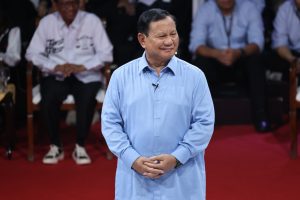On February 14, Indonesia will hold the world’s most extensive single-day election, which will determine both the president and vice president, in addition to selecting almost 20,000 representatives of national, provincial, and district parliaments from a pool of a quarter-million candidates. Despite the vibrant electoral process that has characterized Indonesia since its democratic transition in 1998, however, the country’s political landscape is still predominantly controlled by figures who amassed power during Suharto’s 32-year New Order. No figure exemplifies this more than Prabowo Subianto, the son-in-law of Suharto, a former New Order general who is now Indonesia’s minister of defense and the front-runner to be Indonesia’s next president.
Joko “Jokowi” Widodo, the widely popular incumbent president, disrupted this established order in 2014, becoming the first outsider to penetrate the country’s inner political circles. However, he soon realized that navigating a system controlled by these entrenched elites required adherence to their rules. Now, as septuagenarian powerbrokers such as Megawati Sukarnoputri and Prabowo prepare for the 2024 election, we may well be seeing a return to an era where political dynasties rule Indonesia.
In October, Prabowo made a highly strategic move in appointing Gibran Rakabuming Raka, Jokowi’s 36-year-old son, as his vice-presidential running-mate in order to capitalize on Jokowi’s sky-high poll ratings. Jokowi is also now building out his own political dynasty by giving his support to Prabowo, whom he defeated in the previous two presidential elections. This comes hot on the heels of speculation that he would amend the constitution in order to enable him to run for a third term. It seems that Jokowi wants a seat at the top table for many years to come and if it means giving his support to Prabowo, so be it. It can only be concluded that the decision to help his son run, which was only waved through by a highly contentious Constitutional Court ruling, is intended to secure himself a level of influence once his term concludes, but whether he can control the notoriously volatile Prabowo remains an open question.
Lacking a traditional political pedigree, Jokowi is relying on his enduring popularity and control over state institutions to ensure the election of a successor aligned with his vision, positioning himself as the new generation’s kingmaker. This in many ways marks a return to how the elites have dominated Indonesian politics in the past, such as during the New Order regime. Jokowi hasn’t broken the mold; instead, he has been shaped by it.
Jokowi has also made a highly contentious move by fielding his son on a rival ticket to that of the Indonesian Democratic Party of Struggle (PDI-P), which has selected Ganjar Pranowo, the former governor of Central Java, as its presidential nominee. This has isolated Jokowi from the party that brought him to power and distanced himself from his political “family.” Reports suggest that the relationship between PDI-P chair Megawati Sukarnoputri and Jokowi has become strained, and public disagreements between the two camps have broken into the open. The rift may impact the PDI-P’s electoral prospects, as Jokowi’s influence is crucial, and may have already done so, with Ganjar slipping in the latest public opinion polls. Internal conflicts within the party, including the potential expulsion of members for disloyalty, add further complexity to the situation.
While Jokowi is yet to make a direct endorsement, his has tilted toward Prabowo, who has committed to continuing his government’s policies, even before his son was announced as the former general’s running-mate. Efforts to broker alliances and block candidates suggest an attempt by the political elite to manipulate the election process, despite a degree of unease over Gibran’s political inexperience and the many who see his appointment as a gimmick designed to capitalize on Jokowi’s popularity.
As the 2024 election approaches, old power players like Prabowo, now 72, and known for his shifting political personas, are avoiding hard policy messages and instead seeking to appeal directly to Jokowi’s younger supporters through a carefully crafted social media campaign. Even Anies and Ganjar, Prabowo’s two rivals, have both been fielded by Suharto-era contemporaries that head their respective nominating parties. Despite the breakthrough that Jokowi represented in 2014, as an outsider who stormed to the pinnacle of Indonesian politics, he is now replicating the political playbook of a previous era.
Despite the relative youth of Indonesia’s population, the 2024 election is unlikely to mark a generational shift, with the old guard still in control of candidate selection and likely to play a prominent role in government no matter who prevails on February 14. Ironically, Jokowi, lacking an established dynastic lineage that can ensure his continued influence, has been forced to mirror traditional tactics by forging alliances, using family connections, and impeding newcomers and rivals. This is similar to the tactics used by the New Order and other political families. This raises questions about whether we are now at the beginning of a new “New Order” era, in which family connections and political patronage entrench themselves for a new generation.

































